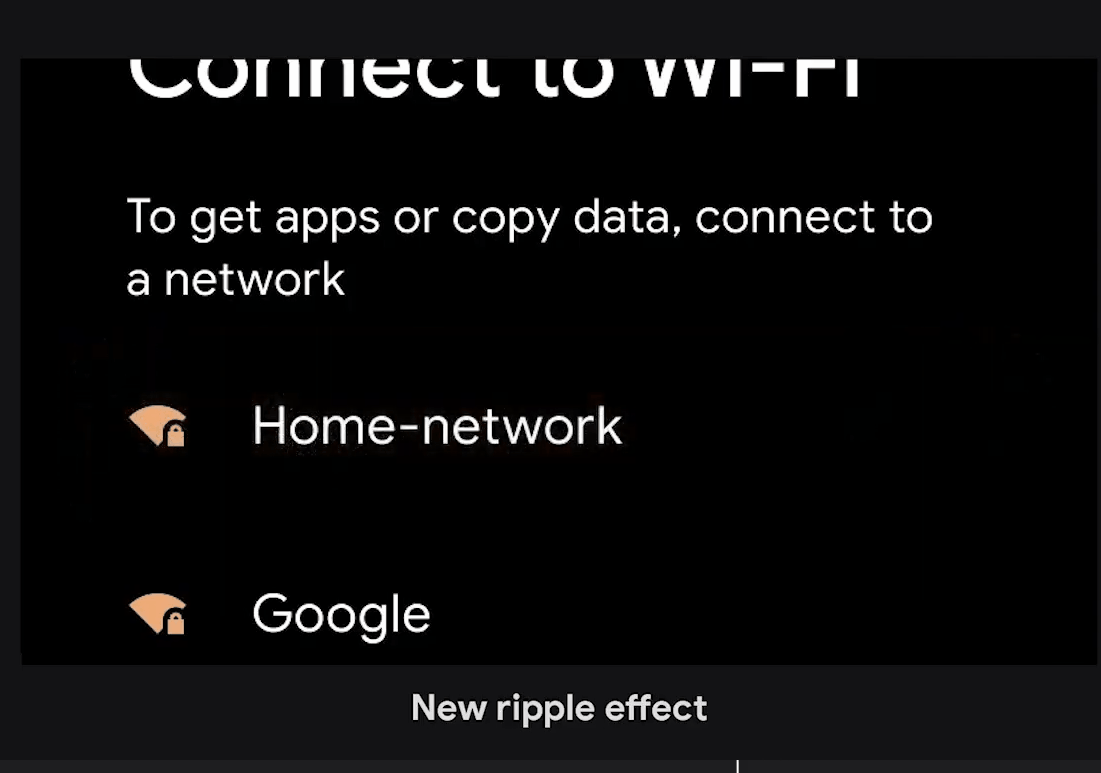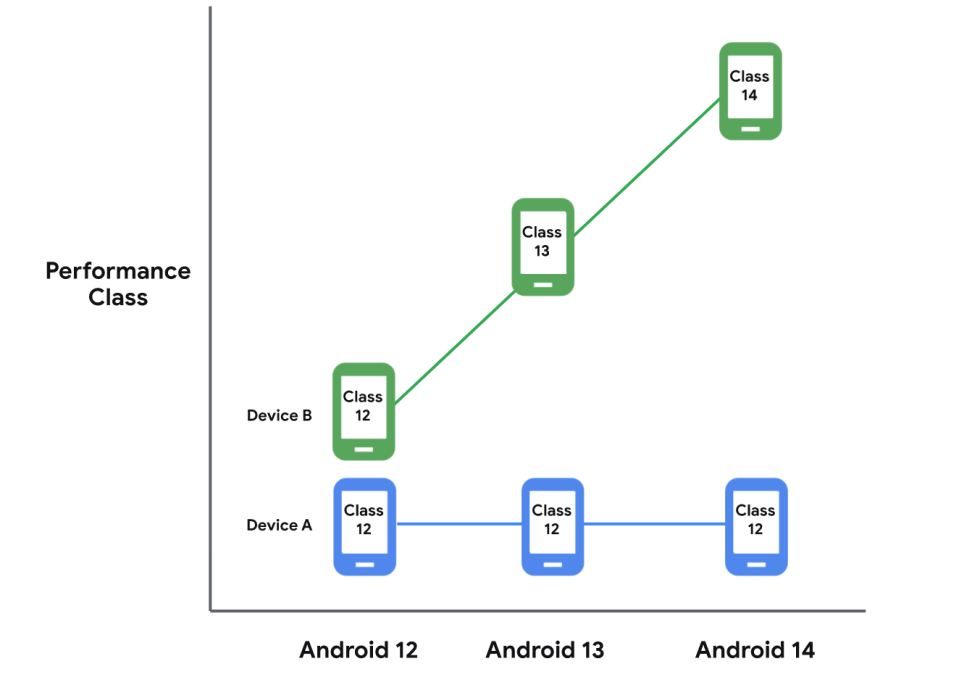 Actual beta screenshots show off the volume controls (which change no colors) and lockscreen notifications.Ron Amadeo
Actual beta screenshots show off the volume controls (which change no colors) and lockscreen notifications.Ron Amadeo The quick settings are big, beefy buttons now. Ditto for the brightness slider.Ron Amadeo
The quick settings are big, beefy buttons now. Ditto for the brightness slider.Ron Amadeo The lock screen and settings get redesigned.Ron Amadeo
The lock screen and settings get redesigned.Ron Amadeo Scrolling has this stretchy effect now.Google
Scrolling has this stretchy effect now.Google This electrified on-touch effect is all over the OS now.Google
This electrified on-touch effect is all over the OS now.Google
Along with the kick-off of Google I/O, the first Android 12 Beta (Developer Preview 4) came out yesterday. In addition to the usual Pixel release, Google says that OnePlus, Lenovo, Asus, Oppo, Realme, Sharp, Tecno, TCL, Vivo, Xiaomi, and ZTE are all putting out compatible releases for certain models, usually their current flagship smartphones. Android 12 had a major redesign announced at Google I/O, but a lot of that is not present in the beta: we're supposed to get a color-changing UI, new widgets, and a privacy dashboard. None of that is in the beta yet. You do get plenty of progress in the notification panel, lock screen, and a few new animation effects, but it's all incomplete right now—as you would expect.
Google's sizzle reel and mockups for the next version of Material Design, called "Material You," look great in canned videos and with carefully curated app mockups. But the real question is how quickly and comprehensively Google will implement Material You. If everything quickly gets a cohesive design, that's great—but if half of Google's apps are on the new design and half are on the old design, that's not so great. Dark Mode was introduced in Android 10 in 2019, and the whole Google ecosystem took about 1.5 years to catch up. Google Maps was the last big Dark Mode straggler with a release coming in February 2021, and just when things were settling down, it's time to change the design again.
Google also detailed ways third-party apps can get in on the color-extraction API that powers Android 12's Pixel theme. This is something that will probably be cool for smaller apps made to fit into the Android design, but most big third-party developers have been resistant to Google's Material Design uniformity. After the initial launch with Android 5.0, many of the follow-up Material Design iterations were about "expressing your brand" with more flexible design guidance. That means Facebook still wants to look like Facebook and wants everything to be blue, while Spotify wants to look like Spotify and make everything green and black.Google has a blog post detailing some of the new additions to Android 12. One big item is better performance. Google says it has "reduced the CPU time needed for core system services by 22%, so devices will be faster and more responsive. We also improved Android's power efficiency by reducing the use of big cores by the system server by 15% to help devices run longer before needing to charge."
Google is also introducing a new standard called the "performance class." The standard is sort of like an advanced hardware spec for Android phones so that they can flag themselves as capable of running the latest features that Google says "go beyond Android's baseline requirements." We've seen more focused versions of Google's hardware certifications before, like "Daydream-ready" phones for VR and ARCore-compatible phones for AR. This sounds like a generic version of that idea, which can change with every version of Android.

Each version of Android will launch with a corresponding performance class—Android 12 will come with Android Performance Class 12; Android 13 will come with Performance Class 13, etc.—as defined in the Android Compatibility Definition Document (CDD). When upgrading, devices can go to Android 13 without qualifying for Performance Class 13, so Google has a way to flag new devices running new software versus old devices running new software.
With Android 12, we'll get Performance Class 12, and Google says, "Initially, we're focusing performance class capabilities on media use-cases, with requirements including camera startup latency, codec availability and encoding quality, as well as minimum memory size, screen resolution and read/write performance."
Here's the full list:
Media
- Concurrent codec sessions
- Startup codec latency
- Frame drops
- Encoding quality
Camera
- Resolution
- Startup & capture latencies
- Video stabilization support
- HDR image capture
Generic
- Memory
- Read/write performance
- Screen resolution
- Screen density
Knowing where or how Performance Class will be applied is difficult. The docs say apps will be able to query the performance class of a device and enable or disable certain features, but lacking some kind of example app that would care about these system requirements, it's hard to picture exactly what Google is expecting. The obvious example of system-requirements-in-action are video game graphics, but that is specifically not a part of this. We struggle to imagine a type of app where a single number representing its capabilities in media playback, camera, resolution, memory, and flash performance is useful. Is the answer again just "Augmented Reality"?
 The Privacy Dashboard was long rumored, but now it's actually arriving with Android 12.
The Privacy Dashboard was long rumored, but now it's actually arriving with Android 12. The location section.Google
The location section.Google This green privacy chip shows this camera app using the camera and microphone permissions.Google
This green privacy chip shows this camera app using the camera and microphone permissions.Google Quick Settings now has kill switches for the camera and microphone (location has always existed).Google
Quick Settings now has kill switches for the camera and microphone (location has always existed).Google You can now limit apps to your rough location.Google
You can now limit apps to your rough location.Google
Google spoke at length yesterday about privacy, too. We now have official confirmation that the Privacy Dashboard is going to arrive with Android 12, which will give you an overview of which apps are pinging your location permissions and when. There was also confirmation of the rumored privacy chip that appears in the top-right corner when your camera, microphone, or location is accessed. Kill switches for the microphone and camera will also appear in the quick settings now.
Google announced another change to location permissions: now you can pick a "Precise" or "Approximate" location permission to grant to apps. This is the way apps request location permissions behind the scenes, but previously for users it was all just bucketed under the "location" popup.
Lastly, Google made the announcement that it's up to 3 billion active devices now. That's a lot of people waiting for Android 12.
Listing image by Google
Technology - Latest - Google News
May 20, 2021 at 07:54AM
https://ift.tt/3v37xS3
Android 12 at Google I/O: Hints of the redesign in the beta, lots of news - Ars Technica
Technology - Latest - Google News
https://ift.tt/2AaD5dD
Bagikan Berita Ini














0 Response to "Android 12 at Google I/O: Hints of the redesign in the beta, lots of news - Ars Technica"
Post a Comment